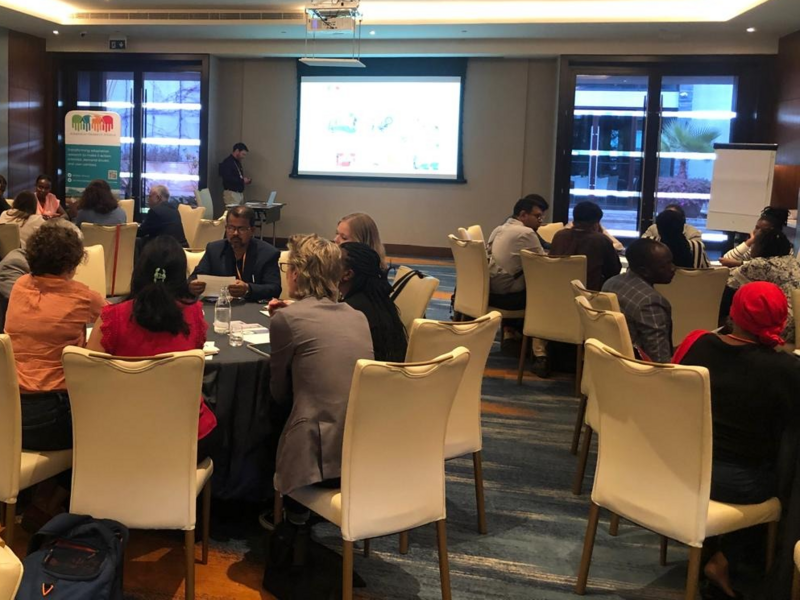
Heatwaves, driven by climate change, have become more frequent and intense, posing significant health, economic, and environmental challenges. In 2023, global temperatures reached unprecedented levels, making it the hottest year on record. This extreme heat led to severe health impacts, including increased rates of heat-related illnesses and emergency department visits, particularly among vulnerable populations such as the elderly and outdoor workers. Economic losses were also substantial, with reduced labour productivity and strain on infrastructure, including power outages due to high demand for air conditioning.
Given the urgency and uncertainties around the climate crisis, action-oriented research, underpinned by the Adaptation Research for Impact Principles, is vital for locally led adaptation (LLA) as it ensures that adaptation strategies are locally relevant, inclusive, and effective, ultimately enhancing the resilience of communities to climate change.
The 18th International Conference on Community-Based Adaptation to Climate Change (CBA18), held from 6 to 9 May 2024 in Arusha, Tanzania, brought together practitioners, community representatives, and researchers working on locally led adaptation. This gathering focused on sharing experiences and insights on locally led adaptation strategies, fostering a sense of community and shared responsibility in addressing climate change.
Navigating the Boundaries of Research Methods and Place-Based Knowledge Systems
A joint session by ARA Member University College London (UCL) and the ARA on 7 May 2024 encouraged participants to share effective practices in generating adaptation evidence. Discussions included developing methods tailored to local climate vulnerabilities, using participatory approaches, assessing the impact of LLAs, and addressing scalability challenges. Participants focused on the Adaptation Research for Impact principles, such as user-centered and needs-driven research, transdisciplinary approaches, and addressing the root causes of risk and vulnerability.
Among the key messages on research and LLA emerging from participants, Innocent Mahali, from OpenMap Development Tanzania, highlighted that integrating local knowledge with scientific techniques and evidence can bring transformational change to communities. In the videos below, you can hear more from Innocent and other participants who shared with us their insights on linkages between action-oriented research and LLA.
Building Local Community Resilience to Beat the Heat Together!
The ARA, in partnership with ARA Member Transition Research, convened a session on 6 May 2024 which aimed to synthesise knowledge on LLAs to strengthen community resilience to heat impacts. The event was open to all participants, and approximately 8 to 15 ARA Member organisations attended. The session delved into the heat nexus—energy, water and food systems—and its implications for LLAs. Participants were encouraged to imagine a 15% solution for a heat-related challenge, which, through peer-to-peer learning, was scaled to a 25% solution. This approach aimed to empower participants by co-creating solutions rooted in local knowledge systems.
The session employed the 15% solution and Troika Consulting liberating structures to engage participants in discovering solutions. Participants were divided into tables, each focusing on different aspects of the heat nexus. They brainstormed potential solutions, such as using wastewater for irrigation, traditional cooking methods, and promoting solar energy. These discussions aimed to build heat-resilient and sustainable communities through carefully curated methods to collect evidence for climate action.
Both sessions, "Building Local Community Resilience to Beat the Heat Together!" and "Navigating the Boundaries of Research Methods and Place-Based Knowledge Systems", were instrumental in fostering dialogue and collaboration among diverse stakeholders. The former provided a platform for exploring innovative locally led adaptation strategies, while the latter focused on integrating traditional knowledge with contemporary research methods. Together they underscored the need for adaptive, locally relevant approaches to climate adaptation. By bringing together diverse perspectives and fostering a collaborative spirit, the ARA and its partners have fostered collaboration among adaptation actors, calling for more inclusive and effective adaptation strategies, ensuring that vulnerable communities have the tools and knowledge needed to adapt to climate change.
By Kweku Koranteng (ARA)
Useful Links
Videos of participants sharing insights on linkages between action-oriented research and LLA:
Join the ARA
Want to join our global coalition? Learn about the benefits of ARA membership and whether your entity or organisation is eligible.
